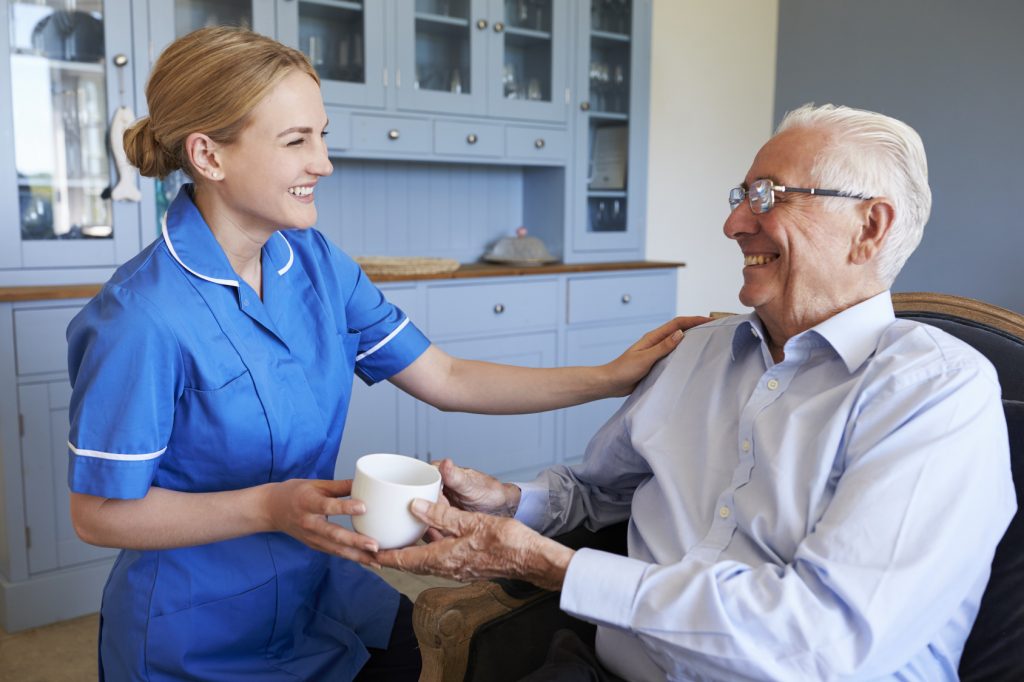
Depression in the older population is not as common as it is in the younger generations. However, when the condition does occur, symptoms manifest in unique ways. When a senior experiences the blues for prolonged periods of time, it’s important to assess whether depression is the culprit.
What is depression?
A serious mood disorder, depression affects the way a senior thinks, feels, and acts. Although depression can occur as people grow older, the condition is not a normal part of the aging process. Any one of several different types of depressive disorders can affect an elderly individual.
Major depressive disorder lasts over two weeks and interferes with a senior’s ability to complete tasks in daily life. Persistent depressive disorder occurs when a senior experiences a depressed mood that lasts longer than two years; however, the senior is able to perform daily tasks.
Depression may also be caused by medications or substances, and substance- or medication-induced depressive disorder can arise after a senior drinks alcohol or takes pain medications. Depression may be a result of a separate medical condition, such as heart disease or multiple sclerosis.
What are the risk factors for depression?
Occasional feelings of sadness are normal. When a senior experiences persistent feelings of hopelessness or sadness, however, clinical depression may be responsible. While many older adults are satisfied with their lives, some may have a high risk of developing depression.
Depression has no specific underlying cause. Elderly individuals, however, face a unique set of depression risk factors. Chronic conditions, for example, can trigger bouts of depression. Reduced mobility decreased functional ability, and chronic pain in seniors can precede depressive symptoms.
Financial struggles can spur long-term feelings of hopelessness, as can a lack of physical activity. Elder abuse is another risk factor for depression. Loneliness is a nationwide crisis that can lead seniors, especially those who live alone, down a path toward clinical depression.
What are the symptoms of depression?
A depressed senior will show telltale signs of depression. Caregivers may recognize depression when the following symptoms manifest: apathy or a sense of no longer caring about life, a feeling of hopelessness that pervades daily living, and a sadness that refuses to fade.
Other cognitive changes that present themselves in seniors with depression include trouble concentrating and irritability. The depressed senior may feel guilty and worthless. Fatigue and low energy accompany depression, as does a loss of interest in activities the senior once enjoyed.
Caregivers may notice that the senior oversleeps or experiences insomnia—both of which are symptoms of clinical depression. Similarly, the depressed aging adult may show a decrease in appetite; on the other hand, the depressed senior may overeat. Persistent digestive problems indicate depression.
Physical signs of depression in aging people include slower speech and movement. A senior with depression may complain of bodily pains that do not improve even with treatment. Recurring thoughts about death may surface in older individuals suffering from clinical depression.
How is depression in the elderly treated?
Detecting and diagnosing depression in seniors is a challenge since many of the abovementioned symptoms are often mistakenly attributed to growing older. Fatigue, for example, may be dismissed as being a part of old age. Similarly, cognitive changes due to depression may be mistaken for dementia.
Nevertheless, when symptoms of depression appear, caregivers are urged to schedule a depression screening with the senior’s medical provider. A comprehensive medical evaluation can diagnose depression or depression mixed with other disorders and result in an optimal course of treatment.
For example, a physician can determine whether the senior’s medications are causing depression-like symptoms. The senior’s doctor will conclude whether an underlying medical condition is responsible for the depressive symptoms; if not, a referral to a mental health professional will be provided.
Interventions for aging adults with depression include antidepressant medications, like selective serotonin reuptake inhibitors (SSRIs), which help balance serotonin and other hormones that impact mood. SSRIs are a commonly prescribed drug for older individuals who show symptoms of clinical depression.
Counseling from a psychologist or other mental health expert is an effective form of treatment for seniors with depression. Also known as talk therapy or psychotherapy, counseling helps seniors identify negative thought patterns and modify them in order to cope with life challenges in a positive way.
Socialization is another way seniors with depression can alleviate their symptoms. Social connections are essential to thriving in life. Older adults who feel depressed are encouraged to reach out to friends and family in person or over the phone. Alternatively, seniors may join a virtual club.
Professional caregivers are excellent and reliable sources of companionship. Elder care experts are positive influences in the lives of seniors, joining them in conversations, taking them on outings, playing card games with them, and, in general, serving as steadfast companions.

Mental health continues to be important even as people age. Seniors are encouraged to live a healthy lifestyle and stay in touch with friends and family. When social connections are difficult to obtain, the elderly can turn to Assisting Hands Home Care for compassionate home care.
Professional caregivers from our reputable home care agency are invested in developing relationships with the seniors we serve. We regularly engage care recipients in activities they enjoy, from hobbies to recreational pursuits. Our pleasant conversations with seniors keep loneliness at bay.
In addition to our quality companion care, Assisting Hands Home Care caregivers help seniors with the activities of daily living. We provide support with personal hygiene tasks, meal preparation, grocery shopping, medication reminders, and light housekeeping. Transportation to social events and doctors’ appointments is included.
While depression cannot be prevented, staying social and living a healthy lifestyle positively impacts a senior’s overall well-being. Companion care provided in the comfort of the senior’s home helps, too. Our services allow older adults to lead full and dignified lives.
Choose Assisting Hands Home Care for all your loved one’s non-medical home care needs.
Call us today to schedule your complimentary in-home consultation.















